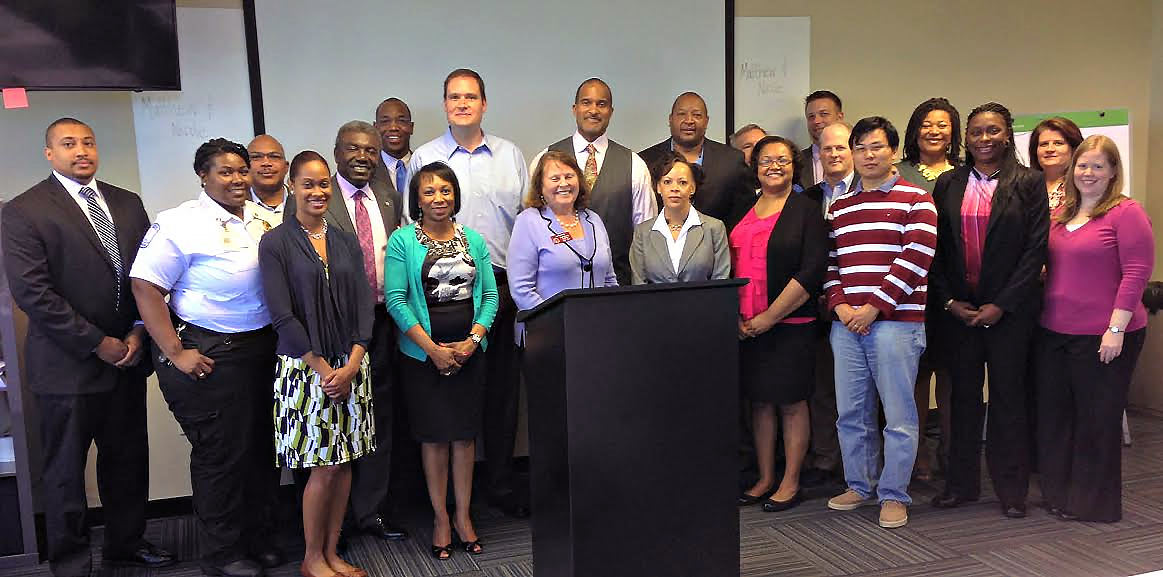
Earth Day Event and Tour at the Weather Channel! A group of Atlanta community, non-profit, academic, government leaders, and business executives gather at The Weather Channel to discuss ways to make the metro-Atlanta area more resilient to extreme weather.
Though many areas already are feeling spring or summer-like conditions, only a few months ago Atlanta, GA—the 9th largest metropolitan area in the United States—was brought to a virtual standstill by a rare snowstorm.
In the wake of the January 2014 storm, Garry Harris, Managing Director of the Center for Sustainable Cities (CSC) and Executive Director for Emerald Cities Metro-Atlanta (ECMA) knew the city could have responded better and needed to be more resilient to extreme weather. As a first step, Harris thought the city and metro-region needed a constructive dialogue. The NOAA Weather-Ready Nation Ambassador initiative dovetailed perfectly with that goal so he signed CSC and Emerald Cities Metro Atlanta up. Building on the Weather-Ready Nation principles, he invited policy decision-makers, educators, media, government leaders, and community leaders to explore together how the city and region could be more ready, resilient, and responsive to snow and other extreme weather.
In March 2014, Harris and his team partnered with Atlanta City Council President Ceasar C. Mitchell to create a regional round table and town hall on Building Resilient Cities, Communities, Towns and Infrastructure to Mitigate the Effects of Extreme Weather.
“The Regional Roundtable and Town Hall was an excellent opportunity to bring all sides of the issue together for the purpose of discussing how the city of Atlanta can best prepare for future severe weather events. We convened elected officials from local, county, and state levels, weather experts and members of the public to work together towards establishing recommendations for submission to the severe weather task forces created by Mayor Reed and Governor Deal,” said Ceasar Mitchell, Atlanta City Council President.
This open forum included the public, the City Council President and City Council, Office of the Mayor (City of Atlanta), the Atlanta Regional Commission, the Commissioner County government, The Weather Channel, the National Weather Service (NWS), Small Business Administration, labor union officials, and several other federal and local agencies including education, transportation and health care. The Town Hall was followed by two high level ‘Lunch and Learn’ meetings, one at the NWS Peachtree, GA, Office and the other at The Weather Companies (TWC), the parent company of The Weather Channel.
The Regional Round Table and Town Hall drew 60 residents and Council reps that, in turn, developed 19 comprehensive recommendations submitted both to the Governor of Georgia and the Office of the Mayor, City of Atlanta. The recommendations detailed action’s the city; region and state need to take to be more Weather-Ready including building more resilient infrastructure. The ‘Lunch and Learn’ sessions and tours gave decision-makers and educators a unique, behind-the-scenes look at public and private weather services and operations. Harris favored the meetings because “the in-person and eye-to-eye contact, when possible, goes a long way in building lasting and meaningful partnerships and the commitment that is needed to be a Weather-Ready Atlanta.”
At the Town Hall meeting, keynote speaker Keith Stellman, NWS PeachTree Office Meteorologist-in-Charge (MIC) compared the 2014 snow event to a remarkably similar snow storm in 1982. Both storms struck with frigid temperatures and occurred on workdays. The key difference, Stellman commented, was a huge increase in population: from two million residents in 1983 to five million in 2014. More people means the area needs to activate emergency plans faster and decision-makers, from the Governor to local homeowners, need to work with orchestra-like harmony. Stellman left an impression on the audience by saying, “we can only have a Weather-Ready Nation once we have a Weather-Ready Georgia”, a comment that stresses that local and state-level coordination is fundamental.
A key message from these events is that a perfect forecast is just the beginning for a Weather-Ready Nation. Communities need partnerships to respond to a forecast quickly and appropriately. The team effort that CSC and Emerald Cities Metro Atlanta organized is the core of a Weather-Ready Nation. NWS Director Dr. Louis Uccellini comments, “The National Weather Service can’t build a Weather-Ready Nation alone. It takes partners – the media, emergency managers, state and local officials, businesses owners and managers, and everyday people like you -- preparing for severe weather and making good decisions.”
Thanks to CSC and Emerald Cities Metro Atlanta engagement, Atlanta and region is taking steps to ensure it will be more prepared when the next extreme weather event strikes, whether it’s a tornado, hurricane, snow storm or even a non-weather challenge. One immediate example, Harris noted was the inclusion of ready, resilient and responsive in a city-scale “ECO-District” for smaller cities, towns and communities.
“The Weather-Ready Nation initiative gave CSC of Atlanta and Emerald Cities Metro Atlanta the pathway to reach far and wide in making these events happen. It was a first on many levels,” according to Harris.
CSC’s and Emerald Cities Metro Atlanta next step is to launch a Science, Technology, Engineering, and Mathematics (STEM) program this fall to teach Atlanta’s youth about the importance of being ready, resilient, and responsive for tomorrow’s weather.